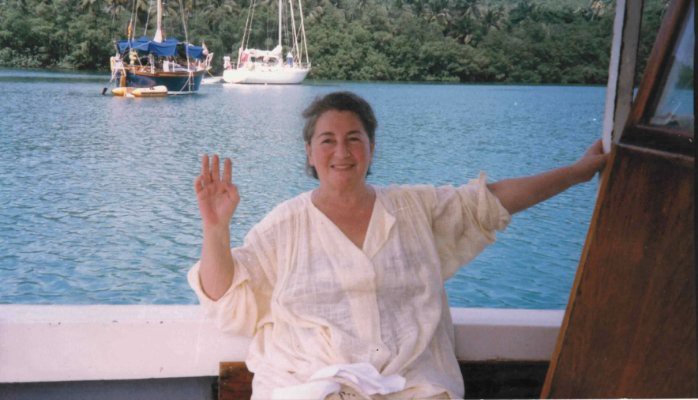This post is an excerpt from Thrive: The Third Metric to Redefining Success and Creating a Life of Well-being, Wisdom, and Wonder.
I was blessed to have a mother who was incapable of having an impersonal relationship with anyone. This doesn’t mean my mother was perfect, but she did live in a constant giving mode.
If the FedEx man arrived to drop off a package, my mom — or Yaya, as everyone called her — would have him come in, sit down at the kitchen table, offer him something to eat.
If you went to the farmers’ market with my mother, or to a department store, you’d better be prepared for a long discussion with the shop assistant or the farmer about their lives before she even got around to asking about something she wanted to buy.
That intimacy with strangers, that empathy toward everyone she encountered, was something I had been surrounded with since I was a little girl in Athens.
Her life was filled with giving moments. Wherever she was — in an elevator, a taxi, an airplane, a parking lot, a supermarket, a bank — she would reach out to others.
Once, a stranger admired the necklace she was wearing; my mother took it off and gave it to her. When the astonished woman asked, “What can I give you in return?” my mother said, “it’s not a trade, darling, it’s an offering.”
Toward the end of her life, she would always arrive at the doctor’s office with a basket of fruit or a box of chocolates for the nurses. She knew that in an office where patients brought their anxiety and pain, the gesture would help change the atmosphere.
Her tenacity in breaking through the barriers that people put up around their hearts was both enchanting and comical. If one of the nurses was, as she put it, “on automatic” and didn’t take the time to be friendly or personal, my mother would whisper to me, “this one doesn’t want to budge,” and would start looking for a way to give her extra attention.
She might produce a little treat from her purse — a package of nuts, a special kind of chocolate — and give it to the woman, knowing she would get a smile. Giving was a way of being for her.
When she died, my mother left no will and no prized possessions, which is not surprising, considering her habit for giving things away. I remember the time we tried to give her a second watch; within forty-eight hours she had given it to someone else.
What she left us with is the treasure house of her spirit. It’s as though certain gifts can be bequeathed only at one’s death — that while she was alive she so embodied the qualities of nurturing, giving, and unconditional loving that it felt as if those dimensions of her life were taken care of for all those blessed to be in her orbit. Why learn how to cook when you live with the Iron Chef?
After her death it became much clearer to my sister and me that if our life’s journey is to evolve as human beings, there’s no faster way to do it than through giving and service.
We mostly focus on the good giving does for others — the good it does for our community. But just as profound is what it does for us. Because it is really true that while we grow physically by what we get, we grow spiritually by what we give.
I was inspired to post this excerpt about how my mother influenced my understanding of serving others by ServiceWorks, a Citi Foundationpartnership with Points of Light and AmeriCorps that uses community engagement and volunteer service as a way to provide 25,000 underserved young adults in 10 cities with the opportunity to develop the skills they need to prepare for college and careers. For more information and to volunteer, go towww.pointsoflight.org/serviceworks.
Originally published at www.linkedin.com.
Originally published at journal.thriveglobal.com


